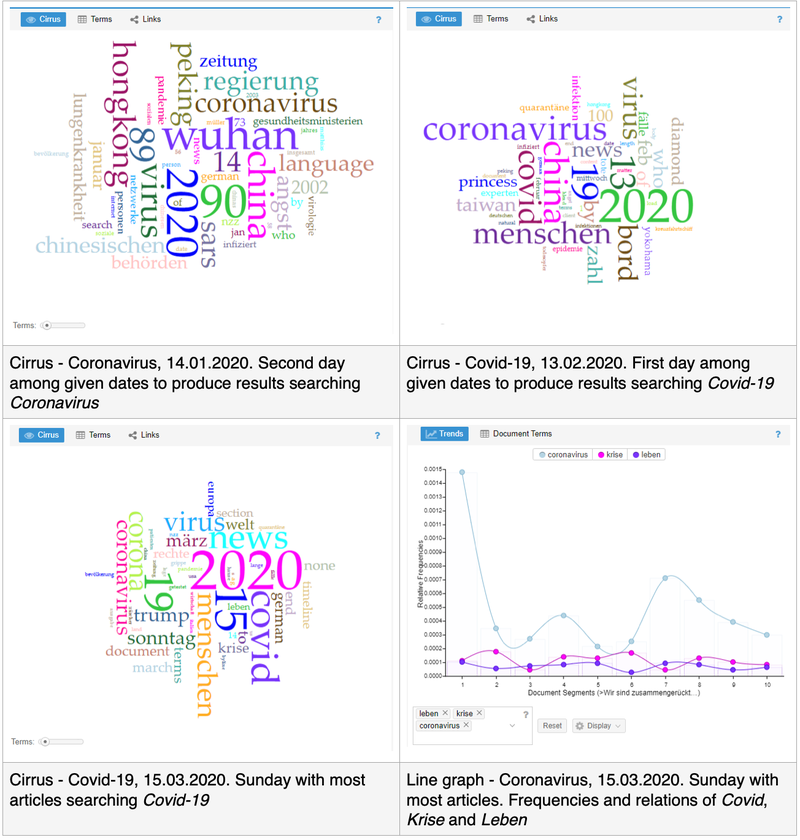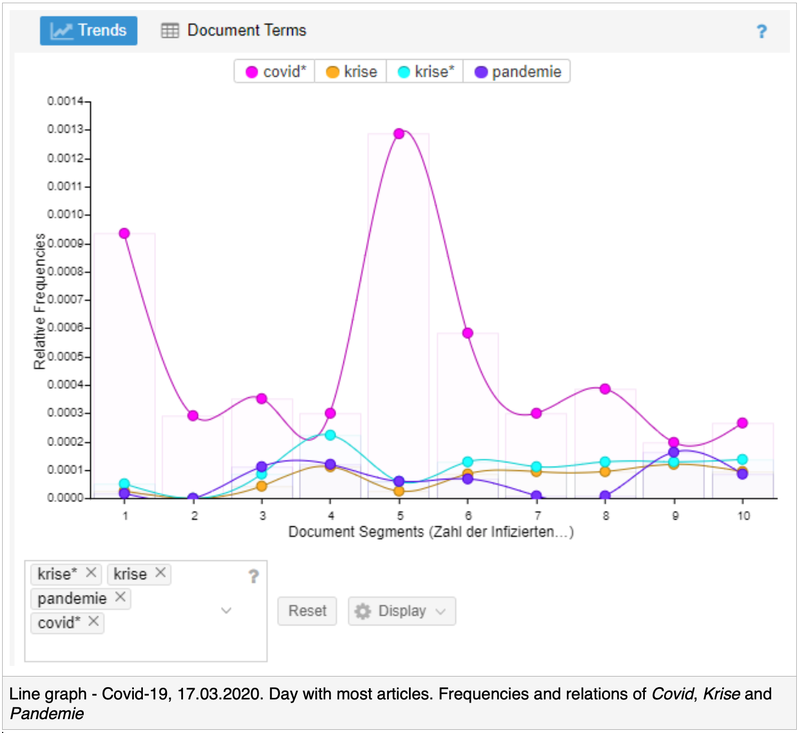Student ambassadors: Joseph Prestwich | Iman Taleb
Keywords January - March 2020
January / early February:
- Ausbreitung - spread
- Panik – panic
- Quarantäne – quarantine
- Geschlossen – closed
- Anstieg – rise
- Wachsen – to grow
- Absagen – to cancel
- Erreger – pathogen
- Angst – fear
- Aufhalten – to hinder, block
March:
- Pandemie – pandemic
- Anstecken – to infect
- Krise – crisis
- Einschränkung – restrictions
- Geschlossen – closed
Correlations
January / February correlations:
- Coronavirus – chinesischen (Chinese), China, Angst (fear), Ausbreitung (spread), Atemwegskrankheit (respiratory illness), Behörden (authorities), Befürchten (to fear/suspect), Beobachtung (surveillance)
- This altered in mid-February to: Berlin, Anstieg (growth), Aktienkurse (stock exchange)
- Mid-February: Arbeitsalltag (everyday working life), ausharren (to persevere), Arbeitgeber (employer), Autoindustrie (car industry)
- Late February: Europa (Europe), Statistik (statistics), rüsten (to arm), verlangsamen (to slow down), Toilettenpapiers (toilet paper), Rechtzeitig (At the right time)
March:
- Tödlich (deadly), wartezeit (waiting time), streiken (to strike), Krieg (war), kooperativ (cooperative), kontakt (contact), Verlagsgruppe (publishing group), Druck (pressure)
General discussion
- Discourse starts in East Asia. Words like Wuhan, China, chinesischen (Chinese) come up the most. The language here describes the virus in terms of symptoms: it is the Lungenkrankheit (lung illness), Atemswegkrankheit (Respiratory illness), Lungenentzündung (inflammation of the lungs), Fieber (fever). There’s a worry about spread (Ausbreitung) and surveillance in China (words like CCTV, Beobachtung). The virus is compared frequently to SARS.
- Definitely, by 03/02/2020 the narrative moves more towards Europe and Germany, with locations like Frankfurt, Rheinland and France occurring frequently. Berlin is mentioned frequently by 10/02/2020.
- As the narrative shifts towards Germany and domestic concerns, the discourse turns towards economics and businesses (and sport). The cancellation of football games and Formula-1 in Vietnam gets a lot of attention. The cancellation of the Verlags- and Buchmesse (large book and publishers fair in Leipzig) received a lot of press attention.
- Neologisms: Geisterspiele (games without a crowd), Infodemie (word used to describe fake news related to coronavirus) and Hamsterkäufe (word for people buying and hoarding goods from supermarkets).
- There is some use of military language in relation to coronavirus: rüsten (to arm), we are “im Kampf gegen" (in battle against).
Interesting note for 19/03/2020. This was the day after a television address from Chancellor Angela Merkel about the pandemic (can be found through YouTube search for “Merkel es ist Ernst”). Some new words come up on this day in the press: klarmachen (to make clear), versprechen (to promise), versichern (to assure), Solidarität (solidarity) – and of course Ernst (serious), as in her perhaps well-known saying: “Es ist Ernst” (This is serious).
Close reading analysis
- 03/01/2020 – no results
- 08/02/2020 – locations include China and Wuhan mainly – Germany mentioned. Wenliang is referred to often, suggesting the focus is still on East Asian countries. Some correlations include Wirtschaft (economy), zunächst (next), husten (to cough), suggesting an interest in economic concerns, where the virus will travel next, and symptoms.
- 06/03/2020 – Ausbreitung (spread), unternehmen (businesses). Germany is now the most referred to country above China. Abgesagt – events are being cancelled. Quarantine has come into effect. Business is on top of the agenda, as well as school closures. There are concerns about a possible recession.
- 26/04/2020 – Pandemic, world and crisis amongst most mentioned words. Thinking about the economy (Wirtschaft). English word creeps in: Lockdown. Looking into global aspects: Iran, Washington, Präsident (president), Donald Trump. Thinking through effects on different parts of the country: Universities and semester starts/cancellations. What’s the “Strategie” (strategy?)
These close readings match the discourse trend, moving geographically from East Asia to Germany and Europe over the three months. What begins as concerns with the global economy and health issues move onto specific economic concerns in Germany – what’s been cancelled? How will quarantine affect businesses? The final example is a Sunday: the tone is more discursive. What are the global implications? How are other countries responding? What is Donald Trump doing? What other aspects of German life will be affected, especially education? Discussion of strategy, rather than simply reporting. Suggestive of the more comment/discussion-based Sunday newspapers. There are fewer articles in general on Sundays and fewer newspaper publications on Sundays too in Germany.
Late March - April 2020

29 March: ‘Leben’ – life – mentioned 107 times – closer inspection: giving tips on how to live better under coronavirus (i.e. things you can do at home), how life has changed; there is talk about poems, intellectuals – It seems Sunday is a time to be reflective, draw on the past for some ideas on how to cope with the current times (talk of the Black Death (Großen Pest) in 1348).
30 March: ‘Geld’ (457) – translates to money – top of the list of most words used – upon closer inspection: talk about ‘Coronavirus will cost us a lot of money’ – ‘Some of us have to live off of ‘Sozialgeld’, social allowance. Most mentioned countries: Deutschland, Germany, (623), Schweiz, Switzerland, (433), USA, (403) – talk referring to improper preparation (‘too late’, ‘instead of doing this…they did that…’ - Italien, Italy, (314) – talk referring to corona cases and the extent of the pandemic there ‘Bavaria is helping Italy in this crisis’ – criticising France for not helping Italy in time ‘when Cuban and Chinese doctors were already in Italy and helping out’ – stressing ‘need for aid for Italy’.
3 April: ‘Tag’ – day – 715 times – examples: ‘that several thousand tests are carried out per day’; ‘The day before, there were 12 and two days ago 15’. ‘around 500 dead a day’ – comparisons still made on a day-to-day basis at the beginning of April.
04 April: ‘Covid-19’ used in relation to the medical side of the debate – one of the most common words used was ‘patients’ or covid-19 was often used with (Erkrankungen) ‘illness’ ‘disease’ or ‘death from Covid-19’.
06 April: Keyword: Euro (mentioned 835 times) – in context: talk about how much Euro will be spent in saving businesses, how much a coronavirus test costs, how much you can receive if you’re affected by coronavirus – another keyword: dpa (mentioned 642 times and throughout the document) – stands for Deutsche Presse-Agentur – it’s a German news agency – produces over 8 hundred reports daily and is referenced in almost every German newspaper or news service – its photo service releases about 1200 photos daily. 1. Covid-19 is mentioned more often than Coronavirus - 3rd most mentioned word: ‘Patienten’ = patients. Talk is around the medical side of the virus – lots of mention of patients and hospitals. Turns out the keyword of ‘hospital’ is because the previous day, Sunday 5th April, Boris Johnson was admitted to the hospital because of coronavirus.
07 April: Mai (338), May, speculative talk about plans of reopening ‘in the middle of May’ or ‘end of May’ – ‘Johnson’ (323) trending – as Johnson moved to intensive care.
11 April: Covid-19: ‘Pandemic’ (426), ‘Patients’ (375), ‘Cases’ (194), ‘Intensive Care Unit’ (151) – talk of Boris Johnson leaving intensive care unit
12 April: ‘Crisis’ used as a synonym for coronavirus – e.g. ‘Is the crisis now being politically exploited?’, ‘despite the crisis, …’ – still reflective on Sundays: ‘This crisis shows that you can get by with fewer trips.’ – ‘“After this crisis, we will be a different society. We don't want to be an anxious not, suspicious society. But a society can be effective with more trust, respect and confidence’.
14 April: ‘Menschen’ = people – mentioned 1024 times – second keyword after coronavirus – upon closer inspection: when people can travel again, how many people have died due to coronavirus, how many people are following the social distancing rules that are in place, talk about the many different problems that people suffer due to coronavirus
15 April: Leben (life/to live) – ‘DIGITALES LEBEN‘ – digital life, Medien (318), media – Wirtschaft (315), economy, Regierung (294) government, Welt (328) world, Sport (235).
16 April: Top-ranking keywords: Euro (523), Unternehmen (company/companies) (496), EU (289), Mitarbeiter (employees) (414), Arbeit (job/work) (323) – in other words: talk is quite economically inclined.
17 April: Prozent – ‘percent’ – 213 times used – examples: ’40 percent of those tested had no symptoms and therefore spread the virus unnoticed’; ‘According to a Bank of America survey of 180 fund managers, 93 percent of them expect a recession in the next twelve months.’; ‘In the past two major crises, 2000 to 2003 and 2008 09, the profits of German listed companies and their share prices collapsed by more than 50 percent each’.
18 April: ‘Wochen’ = weeks – used 759; examples: ‘schools have been closed for weeks’; talk of what will happen ‘in the coming weeks’ – life, during coronavirus, has been talked about in increments of weeks – it seems that at the beginning of the virus, it was days and it changed into weeks – Who knows if the virus will be talked about in months in the future?
19 April: Covid-19: Allow themselves to talk about non-news such as conspiracy theories, e.g. that coronavirus has something to do with 5G.
22 April: ‘Uhr’ – o'clock/clock – (697 times mentioned) – surprising because haven’t seen it in the top-ranking before; examples: ‘Opening times have been limited: everyone has to close at 3 o’clock (3 Uhr)’, ‘UK Government officials turn to the nation at 5 o’clock’ – also lots of information surrounding opening times of telephone lines for problems relating to coronavirus e.g. elderly needing to shop, phone pastoral care, other emergency hotlines.
24 April: 'Wolkig‘ (122) cloudy – towards the end of April, we see talk of the weather reappearing.
26 April: Interesting: talk of Gesellschaft (5), society, at top – found interesting because I haven't seen it at the top before – upon closer inspection: debate almost turned philosophical and reflective asking questions such as ‘What sacrifices should a society make to save the lives of the elderly?’ or talking about ‘How collective fear affects our society and why solidarity is particularly important’ ‘What the world and society have to learn from this crisis’.
27 April: ‘Zeit’ – ‘time’ – (456 times used) – examples: ‘during this time’, ‘especially at this time’, ‘during this difficult time’, ‘it will take time’.
29 April: Correlation between ‘Covid-19’ & ‘patients’ – talk of ‘Covid-19-patients’ – example: ‘Six Covid-19-patients are currently being treated in the Arberland clinics.’, ‘New departments were created to create enough space for critically-ill Covid-19-patients.’
30 April: ‘München’ = Munich, capital of Bavaria, mentioned 298 times – upon closer inspection: news was released about how UEFA Euro 2020 will continue to be held in Munich even though it has been postponed for next year – this was a relief for Germans – the start of mentioning of Trump (258) and the way he’s dealing with coronavirus in the USA – talk about him is very critical (Trump does not miss an opportunity to praise the work of his government; Trump tried to polish his image as a determined crisis manager).
Visualisations

